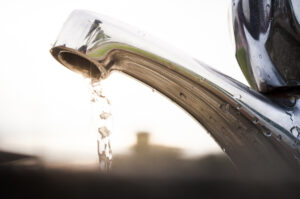
Let’s discuss 3 of the most common plumbing questions and their answers so that you can stay informed on frequent plumbing issues.
Plumbing issues are a common occurrence in households, and many homeowners find themselves puzzled by various problems that arise. To help demystify some of these concerns, we’ve compiled a list of frequently asked plumbing questions and their answers.
Why Is My Faucet Dripping?
A dripping faucet is one of the most common plumbing issues. The persistent drip-drip-drip can be both annoying and wasteful. The primary causes of a dripping faucet include:
- Worn Out Washer: The washer inside the faucet can become stiff, torn, or dislodged over time, causing a leak.
- Corroded Valve Seat: The valve seat connects the faucet to the spout. Sediment buildup can cause it to corrode and leak.
- Loose Parts: Over time, parts within the faucet can become loose, leading to leaks.
Solution: Most of the time, fixing a dripping faucet involves replacing the washer or other internal parts. If you’re handy with tools, you can do this yourself by shutting off the water supply, disassembling the faucet, replacing the damaged parts, and reassembling it. Otherwise, a professional plumber can handle it quickly.
Why Does My Drain Keep Clogging?
Clogged drains are another frequent plumbing complaint. They can occur in sinks, bathtubs, showers, and toilets, causing inconvenience and potential damage.
- Hair: Hair is a common culprit in bathroom drains. It can combine with soap scum to form a blockage.
- Grease: Grease can solidify and stick to the pipes in kitchen sinks, trapping food particles and causing clogs.
- Foreign Objects: Items like cotton swabs, dental floss, and paper towels can easily cause blockages if flushed down the toilet or sink.
Solution: Regular maintenance can prevent many clogs. Use drain guards to catch hair and food particles, and avoid pouring grease down the drain. For minor clogs, a plunger or a plumber’s snake can often clear the blockage. Persistent clogs might require professional attention, as they can indicate more serious underlying issues.
Why Is My Water Pressure Low?
Low water pressure can be frustrating, making everyday tasks like showering and washing dishes difficult.
- Mineral Buildup: Over time, minerals can accumulate in your pipes and fixtures, restricting water flow.
- Leaks: Hidden leaks in your plumbing system can reduce water pressure.
- Faulty Fixtures: Sometimes, the problem is localized to a single fixture due to an internal issue.
- Main Line Problems: Issues with the municipal water supply or the main line to your house can also affect water pressure.
Solution: Begin by checking if the issue is isolated to one fixture or throughout the house. If it’s just one fixture, cleaning or replacing it might resolve the problem. For house-wide issues, check for visible leaks and contact your water supplier to rule out problems on their end. If the issue persists, a plumber can inspect your system for hidden leaks or other issues.
Call Mahon Plumbing Today
If you still have more questions regarding your plumbing, we here at Mahon Plumbing are here to help. We have been serving the wider Baltimore area since 1994, so we have 25 years of experience to back up our fantastic service! Call us at our Baltimore location at 410-766-8566 or our Pasadena location at 410-636-7944. Be sure to keep up with us on social media by following us on Facebook or Twitter.
